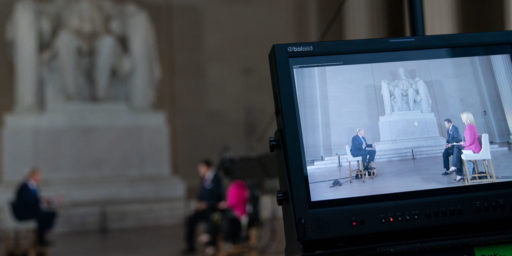Coverage of the Uncoverage
I never thought I’d see this headline in the Financial Times: Breast-baring incident incurs wrath of Congress.
When Janet Jackson bared her breast on network television during the recent Super Bowl half-time performance, the wrath of Congress and the Federal Communications Commission fell on CBS, the Viacom-owned network that broadcast the American football game.
The morning after the Super Bowl, Michael Powell, FCC chairman, said the FCC would launch an investigation into what he described as a “classless, crass and deplorable stunt”. Lawmakers from both sides of the political spectrum jostled to denounce CBS and MTV, which produced the show.
But while regulators and politicians rage indignantly about increasing indecency on television, they face significant obstacles in curbing it. One of the most difficult hurdles involves the cornerstone of American democracy – the first amendment, which guarantees the right to free speech.
The Supreme Court has carved a small exception to the first amendment to allow the FCC to protect children by restricting broadcast television to airing indecent material between the hours of 10pm and 6am. But the exception, which is based on the argument that the public own the airwaves, now appears out of date in the modern media marketplace.
Had Janet Jackson bared all on a cable network or satellite channel, the FCC would have been practically powerless. Popular shows such as HBO’s The Sopranos, despite frequent swearing, are largely free from FCC scrutiny. The courts have ruled that cable is an “invited guest”, which protects the first amendment rights while putting the onus on the viewer to decide whether they want to subscribe or not.
“People don’t make strong distinctions between what they see on over-the-air television and what they see on a cable channel,” says Jeremy Lipschultz, a professor in media studies at the University of Nebraska. “I am real hopeful that the Supreme Court will re-examine this whole area.”
***
John McCain, the chairman of the Senate commerce committee and vocal critic of the cable companies’ rising rates, yesterday suggested the companies should be forced to offer à la carte programming, rather than packages that can combine cartoon networks channels with those offering soft-porn.
Not that anyone’s overreacting or anything.
If Congress is going to get involved in this, they should at least get creative. Perhaps a nudity tax to help pay down the debt? Or, given the temporary need for more boobs on the ground in Iraq, perhaps we could send Janet Jackson over there?






Has it occurred to you that perhaps the reason Congress is getting involved is because the people have demanded it, libertarians notwithstanding?
Not a boob tax, thankyouverymuch.
But consider a penis tax, based on… well…. “wealth”.
Think of the conundrum faced by guys filling out their returns… the natural inclination to over report coming up against an equally natural inclination to under report.
And the audits could get interesting.
But consider a penis tax, based on… well…. “wealth”.
I like the idea, my taxes would drop radically. But I don’t want any laughing during the audit, I don’t consider the matter funny.
Seriously though, I’m glad that Janet’s boob is one of the largest problems facing our nation, as evidenced by the Congressional probe.
—